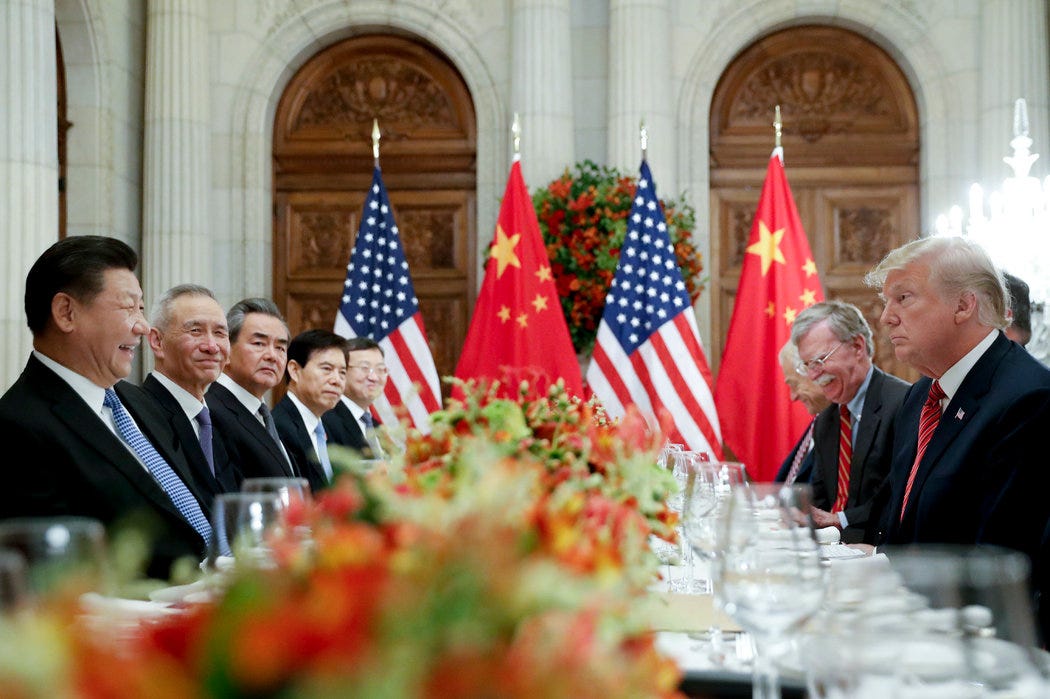Press release of the call between Bessent, Greer and He Lifeng
A frank and detailed discussion
China: He Lifeng held a video conference with U.S. Treasury Secretary Bessent and U.S. Trade Representative Greer.
On the morning of October 18, Beijing time, He Lifeng, China’s Vice Premier and chief representative for China-U.S. economic and trade affairs, held a video conference with Scott Bessent, U.S. Secretary of the Treasury, and James Greer, U.S. Trade Representative.
The two sides conducted candid, in-depth, and constructive discussions on key issues in bilateral economic and trade relations, focusing on the implementation of the important consensus reached during recent communications between the two heads of state this year.
Both sides agreed to hold a new round of China-U.S. economic and trade consultations as soon as possible.
北京时间10月18日上午,中美经贸中方牵头人、国务院副总理何立峰与美方牵头人、美国财政部长贝森特和贸易代表格里尔举行视频通话,双方围绕落实今年以来两国元首历次通话重要共识,就双边经贸关系中的重要问题进行了坦诚、深入、建设性的交流,同意尽快举行新一轮中美经贸磋商。
United States:
This evening, Vice Premier He Lifeng and I engaged in frank and detailed discussions regarding trade between the United States and China.
We will meet in-person next week to continue our discussions.
This evening, Ambassador Greer and Secretary Scott Bessent met virtually with Vice Premier He Lifeng for frank discussions on the U.S.-China trade relationship. Talks will continue next week in person ahead of the scheduled President Trump and President Xi meeting.
During the interactions with the media yesterday in the bilateral lunch with President Zelensky, President Trump said U.S.-China trade negotiations are going very well and that relations are positive. He confirmed China wants to engage in talks and emphasised ongoing dialogue, signalling plans to make mutually beneficial deals. Trump also indicated flexibility on the Nov. 1 trade deadline and highlighted coordination with China on broader geopolitical issues, including discussions related to Ukraine.
Reporter:
Can you tell us more about China?
President Trump:
I will, and I’ll let Scott handle that part. But I think we’re doing very well. We’re getting along with China. China would like to reach an agreement. As of now, we’re set to meet in South Korea in a couple of weeks. It looks like it’s moving forward. They want to meet, they want to make a deal.
I have a very good relationship with President Xi, and we’ll see what happens. For years, China took terrible advantage of our country. We were losing hundreds of billions of dollars a year to them, and in doing so, we practically built their military. The amount of money that past presidents allowed to flow to China was insane. When I came into office, I imposed very strong tariffs, and during my first term, we collected hundreds of billions of dollars from China.
Biden let that go. He kept the tariffs in place but created so many exceptions that they became meaningless. He would give an exception for anything—if you went out to dinner, you’d get an exception. So it wasn’t the same policy anymore.
But I imposed very serious tariffs, and that’s why we’re in a strong position today. Those tariffs put us in a position of power. Without them, we would be weak. Thanks to the tariffs, we collected hundreds of billions not only from China but from others as well. China wants to talk, and we’re happy to talk. We have a good relationship, and we’ll be meeting in South Korea in a couple of weeks. I just returned from a long trip and will soon be heading out on another. Scott, would you like to say a few words?
Scott Bessent:
Yes, sir. The entire relationship is based on the mutual respect between the two leaders. Last week, China carried out a significant, unprovoked escalation, and we were initially unable to reach them. Since then, we’ve had limited communication through the IMF meetings. Their vice premier—my counterpart—and I are scheduled to speak this evening around 8:30 or 9:00. Then our delegations will meet in Malaysia about a week from tomorrow to prepare for the presidential meeting. I believe the situation has de-escalated, and we hope China will show the same respect we’ve shown them. I’m confident that President Trump, given his relationship with President Xi, can get things back on track.
President Trump:
I think we’re in a very strong position. As of November 1, I could raise tariffs to 100% on top of what’s already in place, which would bring the total to about 157%. China doesn’t want that—they want to negotiate. And I think we’ll reach a deal that’s good for both sides.
You have to understand, for decades, trade with China was a one-way street. They got rich because of the United States. Previous presidents wanted to be nice—they didn’t understand what was happening. But I did, long before I entered politics. I used to watch in amazement at how foolish our country was. We’re not foolish anymore.
That also applies to our relationships with the European Union, Japan, and South Korea. All we want is fair treatment. Fairness means hundreds of billions, even trillions, flowing into the United States. Our national security is stronger because of tariffs. Without tariffs, we’d have no security.
I’ll be discussing the situation with China’s leadership soon, and I’d like to see the war end before then. I think there’s a chance for that—if both sides show flexibility. The U.S. isn’t losing people or spending money; we’re being reimbursed for the ammunition, missiles, and equipment we send to NATO. We’ve also reached fair trade deals with both the EU and NATO. We’re not doing this for profit—we’re doing it to save thousands of lives every week. That’s why we’re involved.



Same old BS from the US. We regretted a trade deficit that fueled China’s strengthening of their military, and that’s a bad thing. China spent a minuscule fraction of what we spent each year over the decades, and nobody is supposed to complain. We ring China with a dozen US bases, including putting US marines on JinMen within swimming distance from China, and the Chinese are supposed to just suck it up. Again this is clearly not all about trade.
https://open.substack.com/pub/thiagodearagao/p/five-things-to-expect-from-the-trumpxi?r=2di31u&utm_medium=ios